Hong Kong has been gripped by more than five months of social unrest, claimingly sparked by an extradition bill that would have allowed for the transfer of fugitives to jurisdictions with which the city has no such agreement, including mainland China.The Bill was withdrawn several weeks ago, but the protests continued, in fact intensified, hinting at the imperialists’ conspiracy, chiefly fueled by USA, to pin down and undermine China. Things were hotting up, on the eve of recent elections (see Part 1), more than ever in Hong Kong : The US Senate and House of Representatives passed, on Nov 19-20, a Human Rights Act, yes, for Hong Kong – that amounts to gross interference in China’s internal affairs.
Soon after that, riot police surrounded and laid siege to Hong Kong’s Polytec University, the last stronghold of hardcore protesters, and cleared most of the protesters, apparently without firing a shot. 50 soldiers too joined, for the first time in over five months, they were unarmed, and without battle fatigues. They aided volunteers who were picking up debris and clearing blockades on key roads linking localities. Teargas and water cannons only were employed most of the time. The UK Government has refused to sell crowd control gear to Hong Kong police.One or two people were killed in all these months.
As of Nov 23, the weekend, most of the radicals reportedly left the campus, with police arresting hundreds at checkpoints out of the university. The protesters had disrupted traffic arteries and crippled the nearby Cross-Harbour Tunnel, a key passage way which was still out of service as elections neared.
*** ***
“When China reclaimed the territory (Hong Kong) in 1997, it agreed that its form of government, courts, free press, trade relations, financial system and way of life should remain unchanged for 50 years: “one country, two systems”, in the phrase of Deng Xiaoping, then China’s leader. Though some of the territory’s autonomy was eroded in the 2000s, China largely kept to the deal, its concerns over excessive freedoms offset by a thriving economy and, to some extent, the opprobrium it would face should it break its word.”
This is how the West acknowledges: China largely kept to the deal. It is part of a latest report, in Nov 21st 2019 edition of UK’s economist.com, with the title : Catching fire: Hong Kong stares into the abyss amid growing violence.
And the violence is more by the protesters than the State till now. They hurled petrol bombs, and big rocks, also on citizens passing by or volunteers clearing road-blocks set up by the protesters. But the Chinese patience too has limits. See the class of the protesters, photo below, well funded, equipped and organized with western (mostly US) backing.

July 2019 : Demonstrators breaking into Hong Kong’s Legislative Council Chambers
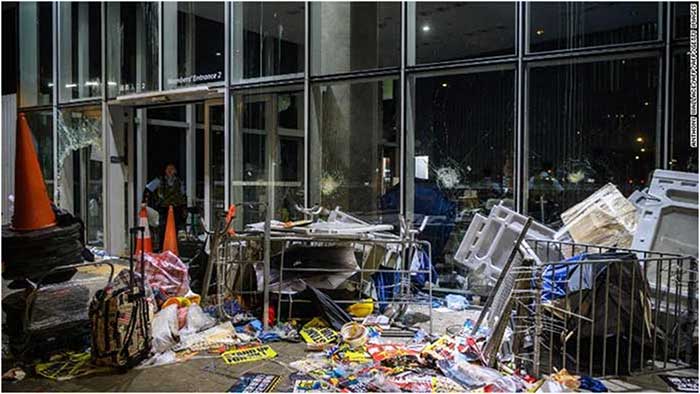
ABOVE: A picture circulated by CNN confirms the out of control violence of the protesters. Even CNN seems a bit confused about the Hong Kong process. The caption reads: A policeman looks at the damage and debris after protesters stormed the legislature hours before in Hong Kong early on July 2, 2019. This image was part of a subtly tendentious dispatch filed by James Griffiths on July 2, 2019 (Hong Kongs democracy movement was about hope. These protests are driven by desperation).
Western media cover the protests sympathetically, almost hysterically, while ignoring real protests in Gaza, Honduras, Sudan, Yemen, and Brazil.
Hong Kong police reported firing 150 tear gas canisters, several rounds of rubber bullets and 20 beanbags during the one day of serious violence, causing 72 injuries, none of which required hospitalization, and making 30 arrests. French police, by contrast, fired 19,000 rubber bullets last year and 5,400 shock grenades, caused 850 serious injuries and 30 mutilations, dozens of facial and skull fractures. Twelve French demonstrators lost one eye. Including those injured by tear gas, water cannon and truncheons, the number would approach six figures, a level of repression not seen since the German Occupation. But the mainstream media has no place for such objectivity.
“Hong Kong has never been a democracy. But in the later years of British rule its Legislative Council (Legco) gradually became more representative of the people. The territory’s courts enjoyed genuine independence, and its citizens a free press. As well as boasting one of the world’s most vigorous economies, the territory bore most of the hallmarks of a free society.” ( We shall see, a little later,the content and quality of the free society and its vigorous economy.)
Under British rule, Hong Kong’s public had no say in political appointment and the Governor, who was Commander in Chief of military forces, could do anything short of sentencing people to death.
Wiretaps didn’t require warrants; when police denied demonstration permits the courts could only review their paperwork; the legislature was a rubber stamp and there was no political opposition.
Under Communist “oppression”, the courts review police decisions for reasonableness, citizens elect their legislators, the government has a political opposition, and the Chief Executive can neither declare martial law nor call out the military.
Some things haven’t changed, however: it is still illegal in Hong Kong to join the Communist Party of China. That is democracy for Hong Kong !
This is the irony in China’s Hong Kong where there are 37,000 NGOs registered (compared to 13,000 in Shanghai, which is four times larger), many of which receive funding from the US and Europe.
((The above section, with the photo and notes, is from a report by Godfree Roberts, whose background includes Ed.D. Education & Geopolitics, University of Massachusetts, He is an expert on Chinese and far eastern affairs.)
But still Hong Kong is projected, day in and day out, as if it trampled democracy that was thriving earlier!
It is more than five months since the political turmoil took shape in Hong Kong : Thousands, sometimes lakhs, of protesters were on the streets for weeks. No other country, no other State allowed that much freedom, for so long in recent past. Till now, it is remarkable, that there was little if any bloodshed. They managed the crowds most of the time with teargas and water cannons. Whereas the protesters were resorting to Molotov cocktails, arson, looting etc. This is in contrast to thousands, and lakhs, killed elsewhere by imperialists (mainly USA), and their native agents on a regular basis. Hundreds of media persons from across the world covered the Hong Kong events, unhindered. Compare what happened in Srinagar for about 15 weeks now.
The economist.com report (Nov 21st 2019) significantly adds :
“The violence of the Hong Kong protests, and of the response to them, is hardly remarkable by international standards. Much worse has happened in Baghdad, Beirut, Santiago and Tehran over the past months.”
“But by the standards of both Hong Kong and China’s Communist Party, these events are shocking. No one would have predicted in May that a proposed change to the territory’s extradition laws could lead to a sustained rebellion lit by burning vehicles.”
Still, the media is full of stories how ‘democracy’ and ‘human rights’ are trampled by the villain , socialist China. Thus these are the standards of democracy and human rights !
*** ***
As Ahmed Gusau Bala, former consul general of Nigeria to Hong Kong said : Every nation, including China, deserves to guard its own sovereignty, he said, emphasizing that China has all it takes to end the ongoing violence in Hong Kong. “If some foreign governments or media are taking sides, then I think it is rather unfortunate,” as foreign interference in the matter might slow down the peace process, he added. Sovereignty question arises in the wake of this:
As Ahmed Gusau Bala, former consul general of Nigeria to Hong Kong said : Every nation, including China, deserves to guard its own sovereignty, he said, emphasizing that China has all it takes to end the ongoing violence in Hong Kong. “If some foreign governments or media are taking sides, then I think it is rather unfortunate,” as foreign interference in the matter might slow down the peace process, he added. Sovereignty question arises in the wake of this:
US Senate passes HR Act, and that for Hong Kong !
Passage of the so-called Hong Kong Human Rights and Democracy Act 2019 by two U.S. congressional committees is height of hypocrisy. Introduced as early as June 13, 2019, a Senate version of the Bill was passed by US Senate, unanimously, on November 19, and by the House of Representatives, the next day, which had passed its own version in October. It is a regime of sanctions of various kinds. It is gross interference in China’s affairs. And both the ruling class parties of USA are one in this highhandedness.
House Speaker Nancy Pelosi had said : Congress has “no choice but to reassess whether Hong Kong is ‘sufficiently autonomous’ under the ‘one country, two systems’ framework.”
William Jones, Washington bureau chief of U.S. publication Executive Intelligence Review, called such a move of the U.S. Congress a pure “interference in the affairs of China.”
“Many of the (Hong Kong) activists will be encouraged by this ‘support’, but if they continue with their destructive vandalism, I think opinion in Hong Kong will turn against them if it hasn’t already,” Jones said.
The U.S. government is giving “false signals of assurance and support” to violent protesters in China’s Hong Kong, Sourabh Gupta, a senior fellow at the Washington-based Institute for China-America Studies, told Xinhua in a written interview. “With regard to the U.S. role, it has been deeply unhelpful,” Gupta said.
“The real problem has been the U.S. veiled intentions: to first stir the pot, and thereafter to fan the flames of protest by providing oxygen to the worst political and militant elements within the protest movement,” he said.
The U.S. bill is “a very prejudicial bill against China and the authorities in Hong Kong,” Richard Becker, west coast coordinator of the U.S.-based civil rights group, Act Now to Stop War and End Racism, said recently at a conference titled “The U.S. Role in Hong Kong: Behind the Headlines” in San Francisco, U.S.
“This bill is not based on the objective situation. It’s based on the political will of those in Congress and in the White House,” Becker said.
“The so-called ‘democracy movement’ in Hong Kong must be seen in this light as an integral part of a strategy to weaken, and even to break up China,” he said.
Eduardo Regalado, a researcher at Cuba’s Center for International Policy, said that the bill is “a pure interference and disrespect for the international law and relations.”
“The United States has double standards on human rights and criticizes only what is convenient for it,” Regalado said, adding that the bill reflects U.S. intention to restrain China’s development.
India silently watches with sheer opportunism, conniving with USA.
Hong Kong People Denounce The Us Act
It is not as if the US Act is welcomed by Hong Kong people, as presented in Western media.
The Friends of Hong Kong Association issued a statement, saying that the Act was blatant interference in China’s domestic affairs and violation of the international law and basic principles in international relations.
“Hong Kong is one of the major trading partners of the United States,” said the statement. “The long-term prosperity and stability of Hong Kong is not only good for its residents, but also in the interests of all countries in the world, including the United States.”
Lo Man-tuen, executive director of Hong Kong Association for Promotion of Peaceful Reunification of China, shared the same view.
“The United States has enormous economic interests in Hong Kong,” he said. “By continuing to create turmoil in Hong Kong, the United States is damaging its own interests as well. It is time for Washington to come back from the brink.”
Keeping Hong Kong from China has been an American priority for decades. One former CIA agent even admitted, “Hong Kong was our listening post.”
Lam Tai-fai, former member of the Hong Kong Legislative Council for the industrial functional constituency, blasted the U.S. politicians’ ill intention to mess up Hong Kong and try to use it to contain China.
He also said a handful of people in Hong Kong, who are willing to trade the interests of Hong Kong and China for their own interests, are cooperating with foreign forces to meddle in China’s internal affairs.
“China used to be poor and backward, but the Chinese people managed to make it a prosperous one,” said Tu Huilong, chairman of the Federation of Hong Kong Guangdong Community Organizations. “There is no reason why we could not properly handle our domestic affairs including the issue of Hong Kong. We don’t need others to point fingers at us.”
He said that foreign forces are behind the Hong Kong unrest, which greatly damaged the economy, reputation, people’s livelihood and the rule of law.
“But the United States, one of the culprits, now jumped out and distorted facts, in a bid to continue messing up Hong Kong and thus split China,” he said. “Its sinister intentions are clear.”
Chiu Tat-cheong, chairman of Far East Consortium International, a property developer and investor, said by manipulating the Act, the United States is staging a political show.
“The United States is playing the Hong Kong card against the background of trade friction with China under the banner of protecting Hong Kong’s democracy and freedom,” he said.
“Human Rights” in Hong Kong
Now let us have a glimpse of Hong Kong’s free society and its vigorous economy. It should be seen in the context of “One Country, Two Systems” : Chinese socialism Vs Hong Kong’s capitalism. Hong Kong had its liberal economy all this while. And the results are glaring, though not projected by the media.
Wake up to the crazy rich-poor divide in Hong Kong, and the government’s role in perpetuating the misery. This is the title of a report, by Alice Wu published on 27 Aug, 2018, in a leading newspaper of the region.
Alice Wu says “some of the figures in Hong Kong are mind-boggling. One in five lives below the poverty line, while one in seven is a millionaire and the government has an embarrassment of riches. So why isn’t it doing more for those in need?”
Well, it’s probably hard to see how bad things are when you’re “comfortable”…
The Hong Kong Poverty Situation Report for 2016 puts one in five Hongkongers below the poverty line, amid the glitz and glamour of “Asia’s World City”. This is a record high for a city with over seven million population.
The government sees the rapidly ageing population and shrinking households as the main drivers of the poverty rate. Of the 1.35 million residents living below the official poverty line, 478,000 are elderly and 200,700 households are “working poor.”
Street scenes familiar in India are common in Hong Kong too. Only they are not projected usually. See below the miserable old man begging on the street; it is from a renowned western source, Bloomberg.
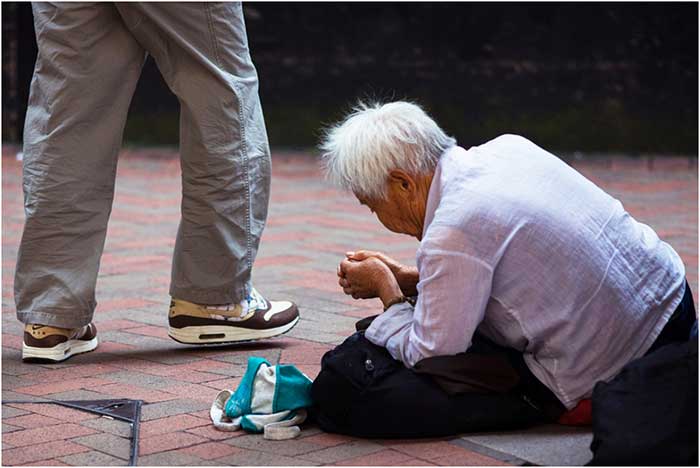
With 970,000 people still determined to be below the line, the scale of the challenge would seem enormous. Photo: Bloomberg
Perhaps, in a city where one in seven people is a millionaire and the government has made a habit of hoarding ludicrous annual surpluses, some have trouble imagining how difficult life can be. Look no further than our “cardboard grannies” – the elderly, mostly female, scavengers who scrape a living collecting discarded odds and ends in the streets. According to a recent survey, more than 80 per cent of them are aged 60 and above. Their average monthly earnings are HK$716. Worse, they face persecution by Food and Environmental Hygiene Department officers. Last month, one such woman was fined HK$1,500 for “littering”. And it took a fully fledged public campaign – complete with an online petition – to get her off the hook. Others often have their trolleys confiscated by officers.
See the photo, given below, from a leading newspaper of the region; SCMP, South China Morning Post, century-old Hong Kong newspaper.
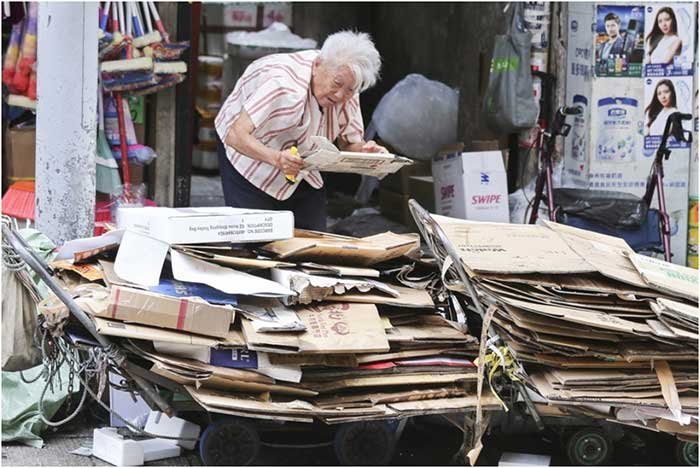
An elderly woman collects cardboard in North Point. According to a recent survey, these “cardboard grannies” earn just HK$716 per month, on average. Photo: Dickson Lee.
The scenes familiar to Indians around Star Hotels and posh localities can be seen in Hong Kong, one of the richest cities of the world. See below:
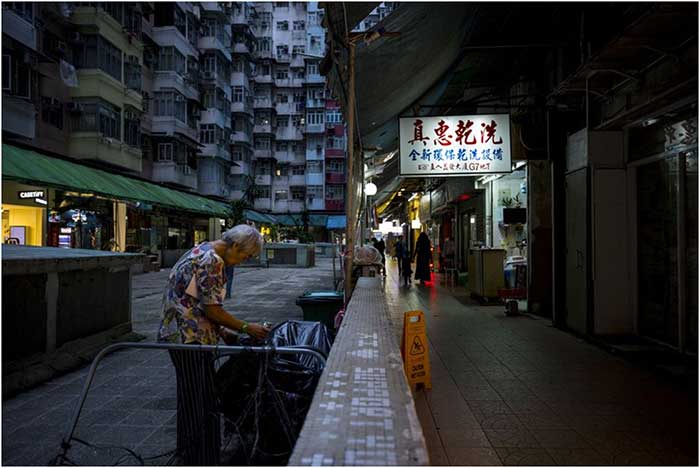
An elder collects waste in Quarry Bay, south China’s Hong Kong Special Administrative Region, Sept. 18, 2019. (Xinhua/Lu Ye). Hong Kong city throws out 3,400 tonnes of food a day.
Godfree Roberts comments:
Hong Kong’s woes illustrate capitalism’s familiar shortcomings: wealth accumulation has far outstripped the development of productive forces and the vast majority of citizens have no way to share its benefits. A large rentier class owns most of the city’s social resources, the same contradiction–between capital accumulation and society’s desire to live a dignified life–we confront in the US.
*** ***
A look into Hong Kong’s housing woes
A ubiquitous type of rental housing in Hong Kong, subdivided units, come from dividing flats into more separate units than originally designed to house more people, usually low-income groups, with lower rents.
According to the data from the Census and Statistics Department of the Hong Kong Special Administrative Region (HKSAR) government in January 2018, Hong Kong had about 92,700 subdivided units with 209,700 people living in them. The per capita living space of those people was 5.3 square meters. One can visualize it by seeing photo of a rented unit, given below.
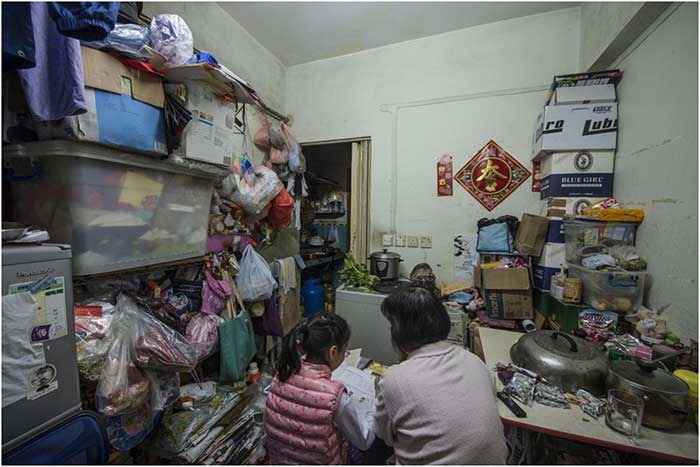
A woman tutors her daughter in her rented house of 20 sq metres.
Most subdivided units are found in old tenement buildings, the majority of which are located in Hong Kong’s poorest district, Sham Shui Po, where Ah Po lives.
Working as a cleaner in Hong Kong, the 68-year-old earns a monthly salary of 9,500 HK dollars (about 1,200 U.S. dollars). To make a better living, she also distributes advertisement leaflets outside metro stations three or four times a week, earning a daily rate of 135 HK dollars. (For comparison, “cardboard grannies” earn just HK$716 per month.)
The rented unit in which she lives is merely 10 square meters, but costs her 3,500 HK dollars a month.
Even with the high rent, it is hard for Ah Po to give up this place where she has lived for almost 10 years. “If I move to a new one, space may be even smaller, but the rent will be over 5,000 HK dollars,” she said.
Although prices differ depending on the location and condition, apartments in Hong Kong sells at over 147,000 HK dollars per square meter in 2019, according to real estate website squarefoot.com.hk. In comparison, the median list price in New York is about 7,650 U.S. dollars (about 60,000 HK dollars) per square meter in 2019, said Norada Real Estate Investments. The average sales price of apartments in Tokyo is 8,497 U.S. dollars (about 66,600 HK dollars) per square meter this year, according to realestate.co.jp.
Thus it is not possible for the majority of the people even to dream of a own house.Many of the toiling classes live a miserable life.See below :
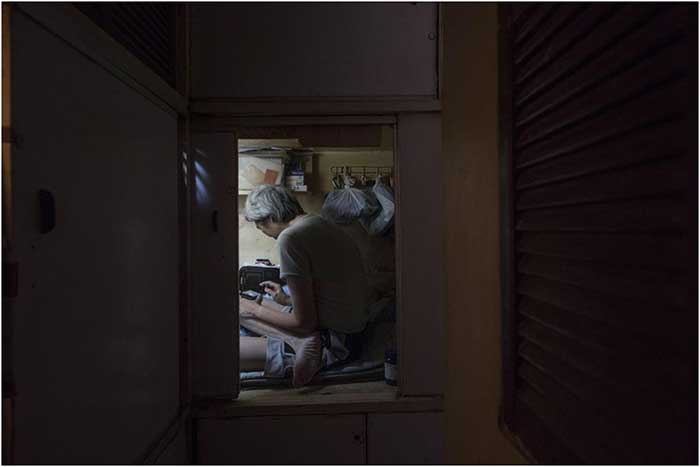
Man aged 52 plays mobile game in his rented house of 1.8 sq m
Rent for an HK ‘coffin apartment’ is HK$2,000/month.
We have to open our eyes to the reality of the city’s increasing vulnerable population: not only the elderly but also the McRefugees and McSleepers, says a report: In five years, there has been a sixfold increase in people sleeping overnight in McDonald’s restaurants. It’s a disgrace that 24-hour fast-food outlets have effectively become part of Hong Kong’s social welfare system. McRefugees aren’t necessarily jobless and homeless, but they find it hard to make ends meet,
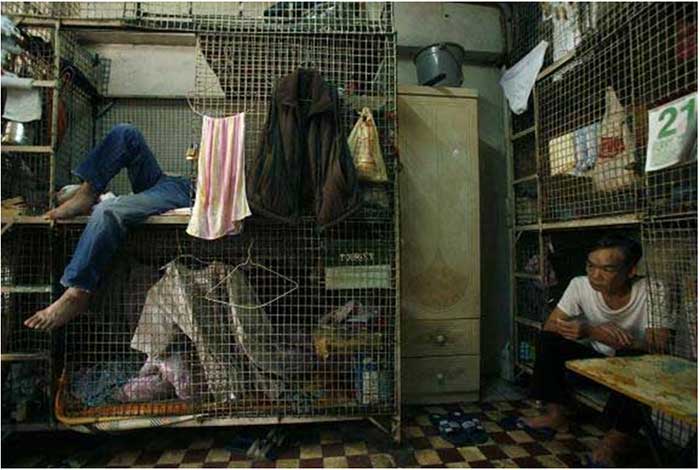
The Good Old Days! Working class life in Hong Kong
( This photo is from a report by Godfree Roberts, whose background includes Ed.D. Education & Geopolitics, University of Massachusetts, Amherst (1973), is an expert on Chinese and far eastern affairs.)
*** ***
Not that no efforts were made by the Govt. to solve the housing problem.
The opposition plays both the angel and the devil.
After China took over Hong Kong, when the Asian Financial Crisis crashed real estate markets, HK’s Chief Executive Tung Chee-Hwa created the ‘85,000 Housing Development Project’ to build affordable homes and diversify the economy by building the Hong Kong Science Park and increasing investment in commerce, education, industry and tourism.
Once the affordable housing units came onto the market, the bourgeoisie opposed them because they affected real estate prices, the legislation voted with the bourgeoisie and the youth demonstrated in their support. Tung was vilified and thrown out.
This is how ‘democracy’ served Real Estate and thwarted efforts to solve the housing problem: With a total area of 1,107 square km, Hong Kong has only developed about 24 percent of the land, while 62 percent of the land has been “locked” by law from being developed; land for residential use accounting for a mere 6.9 percent, according to data from the HKSAR government.
As a response, the HKSAR government has to squeeze land from the remaining 14 percent or reclaim land from the sea.
Experts observe that the HKSAR government often encounters interference and obstructions from the opposition and vested interest holders regarding government land expropriation or island-building plans.
For political purposes, the opposition has hyped the plight of “soaring property prices” and “people’s destitution” on one hand and applied various reasons and excuses to prevent land development on the other hand.
Some vested interest groups, once noticing that their own interests are at stake, have put pressures on the government through various means, including taking legal actions.
In recent years, concerning the case of the relocation for Hong Kong’s first-ever high-speed railway or the development of the Northeast New Territories, the opposition has repeatedly played the role of organizer and instigator for obstruction.
The HKSAR government’s plans to develop the areas around country parks and reclaim land from the sea have also come under attack from the opposition, citing environmental concerns.
“They play both the angel and the devil,” said Chan Yung, a deputy to the National People’s Congress and vice chairperson of the DAB, adding that the opposition has kept making trouble while blaming the government for achieving nothing.
Changing Economic Structure
In the 1970s, nearly half of Hong Kong’s labor force were industrial workers when manufacturing thrived in Hong Kong. During the 1980s, Hong Kong’s finance, shipping, trade and logistics and service industries started to boom. Since then, the economic landscape began to change amid subsequent industrial upgrading.
Due to the hollowing out of the manufacturing industry, the wealth gap in Hong Kong widened and the class division worsened. Despite the prosperity of finance, trade and tourism in recent years, more than 1.37 million people are living below the poverty line in Hong Kong, home to more than 7 million.
Working career options are now limited, leaving little hope for the youngsters to move up the social ranks.
As a result, Hong Kong’s social class has largely been solidified in the 21st century, with the richest people dominated by property developers and their families.
The Gini coefficient, which measures the inequality of income distribution, reached a new high of 0.539 in 2016, far above the warning level of 0.4, according to data by the HKSAR government’s Census and Statistics Department. The greater the number toward one, the more inequal in income distribution.
Though the HKSAR government tried to narrow the wealth gap, many people in Hong Kong said they are not sharing the fruits of economic prosperity, the young and those low-income groups in particular.
Stagnating Political Barriers of ‘Democracy’
What makes the deep-seated problems in Hong Kong such a hard nut to crack?
When China joined the WTO in 2001, trade bypassed Hong Kong, stagnation set in and the city’s best and brightest joined Taiwanese seeking a better life on the mainland.
The reason is complicated, according to observers, partly due to the containment in the current political structure that leads to governance difficulty, partly due to a doctrinaire implementation of the principle of “small government, big market,” or laissez faire, and most importantly due to the opposition’s “say no for none’s sake” that stirs political confrontation and sends Hong Kong into a dilemma of discussions without decisions, or making decisions without execution.
Results of laissez faire
Hong Kong trails only London and New York for the largest concentration of individuals worth more than $30 million.
Hong Kong’s ten richest citizens account for 35% of its GDP.
Apartments in Hong Kong sells at over 147,000 HK dollars per square meter in 2019, as seen above. In comparison, the median list price in New York is about about 60,000 HK dollars ; in Tokyo is about 66,600 HK dollars.
Hong Kong’s household GINI is 0.539, Singapore’s is 0.458 in 2016, America’s is 0.394 and the UK’s is 0.358. (0=equality).
Over the past 22 years, the successive HKSAR governments have tried many times to tackle these problems by rolling out affordable housing programs and narrowing the rich-poor gap.
“Since Hong Kong’s return, many economic and livelihood issues would not be as politicized as they are now, should the HKSAR government have introduced more policies and better social security arrangements to address those problems,” said Tian Feilong, a law expert of the “One Country, Two Systems” Center with the Beijing-based Beihang University.
To carry out major policies or push forward major bills, the HKSAR government needs to garner the support of two-thirds majority at the Legislative Council (LegCo).
The HKSAR government’s previous motions, be it economic policies or fiscal appropriations, were impeded by the opposition time and again at the LegCo, regardless of the interests of the majority of Hong Kong residents and the long-term development of the society.
The HKSAR government sought in 2012 to establish the Innovation and Technology Bureau to ride the global wave of innovative startups, diversify its economic structure and bring more opportunities for young people. Such efforts, however, were obstructed by the opposition at the LegCo in defiance of repeated calls by the public. After three years, the proposal to create the bureau was finally passed by the LegCo.
Repeated political bickering stalled Hong Kong’s social progress amid the sparring, and the opposition created a false target and blamed the Chinese mainland for those deep-seated problems.
( Xinhua Report 2019-09-07: Behind Hong Kong’s chaos lie deep-seated social problems)
To remind : Alice Wu says “some of the figures in Hong Kong are mind-boggling. One in five lives below the poverty line, while one in seven is a millionaire and the government has an embarrassment of riches. So why isn’t it doing more for those in need?” It is this rentier class and their western backers who seek to keep HK away from PRC.
Like in USA, capitalist ideology is sustained. No surprise, HK’s ‘democracy’ does not legally allow its people to join CPC, the party that rules China of which HK is one part.
*** ***
229,600 Hong Kong Children Being Left Behind
That is because they are too poor to learn and play with others. For families below the poverty line, extracurricular activities are a luxury they can ill-afford, even if that means a child’s future is put in doubt.
Hong Kong’s profile now resembles Britain’s: 23% of its children live in poverty– compared to the mainland’s 1%.
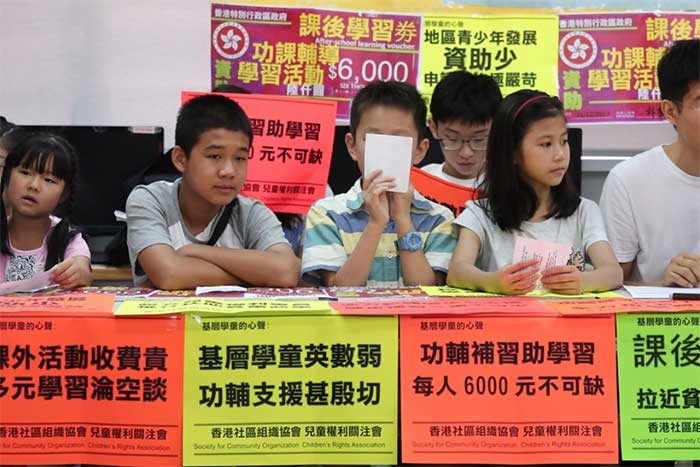
(from left to right): Lau Ka-kei, Lau Ka-po, Chan Fun-tim, Alice Yeung and Wong Chi-yuen, at the Society for Community Organisation press conference on child poverty in Hong Kong. Photo: Jonathan Wong
There are more than 200,000 children who are too poor to learn and play with their peers. They can’t afford extracurricular activities or tutoring – they are becoming an inaccessible luxury – and are caught in the poverty trap.
A new survey, conducted by the non-profit Society for Community Organisation, found 60 per cent of children from such households unable to take part in any extracurricular activity due to financial constraints. The poll, carried out on 157 children aged 3 to 18 from low-income families, also found half did not take part in after-school tutoring or homework support classes, for similar reasons.
Those that did, spent an average of HK$819, or 7.7 per cent of their average median income, mostly for English lessons.
Community organiser Sze Lai-shan said a lack of access to tutoring and extracurricular activity could curb learning and development, reducing a child’s future social mobility.
“Education is a very important stepping stone out of poverty,” she said. “Extracurricular activities are also good for a child’s well-being and all-rounded development. It also lets them learn another skill.”
Sze said educational inadequacies at such an age exacerbated inequality, and this was seen in disparity in university admissions.
According to a 2013 Education University study, admission rates to Hong Kong’s universities were roughly the same among the children of poor and wealthy families in 1991 – 8 per cent compared to 9.3 per cent. By 2011, the disparity had grown fourfold to 13 per cent and 48 per cent.
That was the title of an illuminating dispatch, of July 5, 2019, by Far Eastern correspondent Godfree Roberts on the puzzling Hong Kong crisis, whose contradictions are cynically exploited by the Western media, all according to Washington’s plan. Have we seen this movie before? Yes, we have, in 2014, and in scores of other places victims of some “color revolution”, wherever America’s “soft power” is allowed to sink its devious claws.
Lau Pui-King, an economist in Hong Kong, snubbed the opposition’s resistance of or even antagonism to the Chinese mainland, saying such thinking of secluding Hong Kong from the entire country could end nowhere but push the city down an abyss.
“To come out of the current economic difficulty, Hong Kong needs to be linked with the Chinese mainland much closer and more effectively,” she said.
“Seclusion brings no development opportunity for Hong Kong,” Lau said. “Some youngsters don’t understand that Hong Kong would be even worse if it is secluded from the Chinese mainland.”
It is these youngsters, funded, equipped, trained and organized by USA, who are victims of American Brainwash.
Hopefully, they will see reason after this turmoil comes to an end. They should see how Chinese socialism tackled the problems, of the most populous and once most backward country, as never before,as appreciated by leading western economists:
China’s Poverty-Alleviation Campaign “a Huge Success”: Nobel Laureate
“China has experimented a lot to find ways to improve economic development and to reduce poverty, and in that process, it’s been very successful,” Michael Kremer, a Harvard professor whose research examines education and health in developing countries, immigration and globalization, told Xinhua in a recent interview. He is a recent Nobel laureate in economics. (Xinhua| 2019-11-14)
A decentralized approach “combined with appropriate incentives has been a powerful ingredient behind China’s success in fighting poverty,” said Kremer, who received the 2019 Nobel Prize in Economics, together with MIT professors Esther Duflo and Abhijit Banerjee for their “experimental approach to alleviating global poverty.”
China’s efforts in fighting poverty over the past decades has been “a huge success” amid the sustained growth in the country driven by reform and opening-up, the U.S. development economist and Nobel laureate has said.
Since the founding of the People’s Republic of China in 1949, it has lifted over 800 million people out of poverty, which represent over 70 percent of global poverty reduction.
Another element behind China’s success in poverty relief “is the process of experimentation,” in which new policies are often introduced in a particular region before being spread more broadly, according to him.
China has made historic achievements in fighting poverty, making the country a major contributor to the world’s poverty reduction endeavors.
It was to the credit of People’s China that they overcame the cold-war mindset and conducted the bold, novel and historic experiment of “One Country, Two Systems” : Chinese socialism Vs Hong Kong’s capitalism.
The results are there for all to see, as analysed by a leading western economist:
“No Country Even Remotely Approaches China” : John Ross
“Between 1978 and 2017, China’s economy expanded at an annual average 9.5% growth rate, increasing in size almost 35 times,” John Ross, Senior Fellow at Chongyang Institute for Financial Studies, Renmin University of China said.
Japan also witnessed a 39-year fastest growth period during 1950-89 when it expanded at an annual average 6.7% or by almost 13 times, he compared.
“The total expansion of China’s economy over a 39 year period was almost three times as much as Japan’s,”Ross summarized.
However, the extraordinary growth rate alone considerably understates the immense scale of China’s achievement, he said.
This is because China, while undergoing a sustained rapid economic growth, constitutes a far larger part of global population than any other country, Ross analyzed. He continued to demonstrate convincing figures.
“The first country to experience sustained rapid growth was the UK in the Industrial Revolution. It was 2.0% of the world’s population,” Ross said.
“Sustained rapid U.S. economic growth, after its Civil War, was in a country with 3.2% of the world’s population, he continued.
No other economy commencing sustained rapid economic growth even remotely approaches the 22.3% of the world’s population as China had in 1978 at the beginning of reform and opening up, he concluded.
China and its people, as they celebrate 70th Anniversary of formation of PRC, face many challenges, no doubt. But not only GDP data, but parameters of poverty, unemployment, environment, show China tackled many of the problems western capitalism failed to tackle. They survived and overcame the crises of 2007-08, and are tackling also the current one gripping the world, India included. They shifted gears to a concept of scientific and sustainable development. Now GDP is not the only watchword.
The West gave Michael Kremer Nobel for economics, but his appreciation for China should not benefit Hong Kong, Western colony for 150 years. It should remain like a neo-colony for as long as possible. And that is what the current movement for Democracy serves. Human Rights is the cover for their ends.
PRC at 70, and Reforms at 40
China recently celebrated 70 years of PRC, and 40 years of its Reforms. The achievements mentioned by Kremer and John Ross, cited above, are the results of this journey. China summed them up as follows:
2018 marks the 40th anniversary of reform and opening up in China. The Communist Party of China (CPC) has led the people in carrying out this great new revolution in the new era-one that holds the key to the destiny of contemporary China. Reform and opening up has helped to liberate and develop social productive forces. It has opened up a path of socialism with Chinese characteristics, and ushered in a new chapter in the development of human rights.
Over the four decades, the Chinese people have worked hard as one under the strong and coherent leadership of the CPC. Huge changes have taken place, and living standards have significantly improved. The Chinese nation has risen and become prosperous and strong.
Over the four decades, the CPC has always prioritized the people’s interests, ensuring that reform is conducted for the people and by the people, and that its benefits are shared by the people. It has worked to safeguard the fundamental interests of the overwhelming majority of the people, respect human values and dignity, and promote the well-rounded development of the people.
It is not as if China and its socialism have no place for human rights, as the West seeks to paint..
China has its own concept and model of human rights as stated below :
Integration of the principle of universality of human rights with China’s national conditions.
The universality of human rights is grounded in human dignity and value, and based on common interests and basic moral norms shared by all.
There is no universally applicable model for fulfilling human rights, and human rights can only advance in the context of national conditions and people’s needs.
The CPC and the Chinese government approach human rights from a historical, dialectical and developmental perspective, and take advantage of the strengths of socialism with Chinese characteristics while bearing in mind the overarching condition that China is still and will long remain in the primary stage of socialism, integrating universality with particularity.
The central authorities take proactive steps to meet the people’s need for development, and advance human rights in a planned and progressive manner.
(Extracted from White Paper, of December 2018, on HR : Progress In Human Rights Over The 40 Years Of Reform And Opening Up In China. (Xinhua) December 14, 2018. http://en.people.cn/n3/2018/1214/c90000-9528739-3.html)
The movement in Hong Kong is carried on and promoted in the name of ‘democracy’ and ‘human rights’. There is some respite in it in the context of recent elections. Not only Hong Kong, its youth and the winners in the present elections, but the entire world has some significant take-aways from all this.
The Contents of the White Paper, given below, indicate China’s approach: In their scheme of things, Primary focus is on the rights to subsistence and development.
Foreword
I.Firmly Establishing a Governance Principle of Respecting and Protecting Human Rights
II.Better Protecting the Rights to Subsistence and Development
III.Fully Developing Human Rights in All Respects
IV.Ensuring the Rights of Special Groups
V.Comprehensively Promoting the Rule of Law for Human Rights
VI.Facilitating the Development of Human Rights in the World
VII.Active Participation in Global Governance of Human Rights
VIII.Path of Human Rights Protection Suited to National Conditions
Conclusion : The White Paper concludes as follows:
“There is always room for improving human rights. To protect human rights to a fuller extent, China still has a long way to go and faces many difficulties and challenges.”
The past 40 years of reform and opening up have seen a growing sense of gain, happiness and security, and noteworthy progress in the cause of human rights in China. It is a fact that the Chinese people have never enjoyed a more extensive range of human rights than they do today.
China is the largest developing country in the world. Its progress enables the Chinese people to enjoy human rights to a fuller extent, contributes significantly to the development of humanity, and shares with the world China’s experience in protecting human dignity and enriching the diversity of human rights culture.
There is always room for improving human rights. To protect human rights to a fuller extent, China still has a long way to go and faces many difficulties and challenges. As China is still and will long remain in the primary stage of socialism, pressing problems caused by unbalanced and inadequate development await solutions. Many areas concerning public well-being require improvement.
Poverty alleviation remains a formidable task. The people’s aspirations regarding employment, education, health care, elderly care, and environment are yet to be satisfied, and protection of human rights under the rule of law needs to be enhanced.
The Chinese people are striving to achieve the Two Centenary Goals and the Chinese Dream under the leadership of the CPC Central Committee led by President Xi Jinping.
Through perseverance in the coming decades, they will enjoy better protected human rights and greater dignity, freedom and happiness. The cause of human rights in China can look forward to prospects of a brighter future.
That is how the White Paper concludes.
“One Country, Two Systems” : This is a novel and bold experiment, going on in Hong Kong, People’s China is engaged in it, instead of a Cold War outlook that plagued the world for too long. Chinese Socialism Vs Hong Kong’s Capitalism is a peaceful contest in development models.
China is extending the hand of friendship and peace to people across the world, including the West. It needs to be reciprocated by one and all.
(All emphases added.)
See Part-1 : Hong Kong Poll Results X-Rayed
See also : American Brainwash : Hong Kong’s Poisoned Chalice, by Godfree Roberts, July 5, 2019, https://countercurrents.org/2019/07/american-brainwash-hong-kongs-poisoned-chalice
Ramakrishnan, Political Observer, who contributed to Countercurrents.org.
China warns U.S. for interference in Hong Kong and threatens of firm counter measures
by Countercurrents Collective
China has warned that continued U.S .meddling in Hong Kong is “doomed to fail” and threatened “firm counter measures,” after President Donald Trump passed two bills
backing ongoing protests in the territory.
“One Country, Two Systems” : Chinese Socialism Vs Hong Kong’s Capitalism – Hong Kong update- Part 2
by Ramakrishnan
Things were hotting up, on the eve of recent elections, more than ever in Hong Kong : The US Senate and House of Representatives passed, on Nov 19-20, a Human Rights Act, yes, for Hong Kong – that amounts to gross interference in China’s internal affairs.
No comments:
Post a Comment